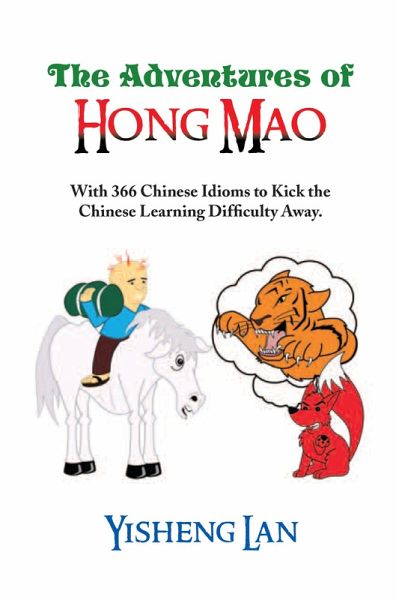
The Adventures of Hong Mao (eBook, ePUB)
With 366 Chinese Idioms to Kick the Chinese Learning Difficulty Away
Versandkostenfrei!
Sofort per Download lieferbar
2,99 €
inkl. MwSt.
Weitere Ausgaben:

PAYBACK Punkte
1 °P sammeln!
A red-haired naughty boy Hong Mao saw that a silly hare had hit its head accidently against a tree trunk and died. He picked up the hare, gave it to his mom so she could make it into a delicious dinner. He then waited near the trunk everyday hoping hares would come continuously and hit their heads against the tree. His dad had gone to town on a trip and had told Hong Mao to sow seeds in the farmland, but Hong Mao only concentrated on his plan of catching hares and forgot about the sowing. Half a month later Hong Mao suddenly remembered his dad's order. He then sowed seeds in a rush. Seedlings ...
A red-haired naughty boy Hong Mao saw that a silly hare had hit its head accidently against a tree trunk and died. He picked up the hare, gave it to his mom so she could make it into a delicious dinner. He then waited near the trunk everyday hoping hares would come continuously and hit their heads against the tree. His dad had gone to town on a trip and had told Hong Mao to sow seeds in the farmland, but Hong Mao only concentrated on his plan of catching hares and forgot about the sowing. Half a month later Hong Mao suddenly remembered his dad's order. He then sowed seeds in a rush. Seedlings grew very slowly because of the delay in time. For fear of dads rebuke, Hong Mao quietly got up at midnight to "help" the seedlings grow more quickly by pulling them upward. When Hong Mao's dad came back home, he saw all of the seedlings lying down in the field with their roots exposed in the air. He knew that Hong Mao had done this. Dad asked Hong Mao why he had made this mess, and wanted him to admit his fault. Hong Mao did not acknowledge his mistake, but instead said that this had been the hares' fault. Lately, no hares had come to hit their heads against the tree trunk, and so he had to wait patiently for them; had it not been for the hares' fault, he would have remembered his task and would not have pulled the seedlings upward, and would not have been criticized by dad. Hong Mao's dad was so angry that he slapped Hong Mao's face. Hong Mao did not cry. Instead, he decided that he would leave home to visit various scenic spots, and make a living wandering from place to place. In his adventurous journey Hong Mao experienced more than a few strange affairs, met many interesting people and animals and learned a lot about the world. In the end, his trip turned the naughty boy into a good one. ************************ The Chinese language has become a popular subject to study in recent years. However, because it is not an alphabetic language and is quite different from other languages, it is not very easy to learn. Are there any knacks to quicken the learning process? The answer is YES! The key to success lies in learning Chinese idioms. Chinese idioms are not just a play on words; they are the heart and soul of the language. There are roughly one thousand very popular idioms in Chinese, and among them, about half are most frequently in use. Many of them are very vivid and interesting. Learning Chinese idioms can greatly increase readers' interest, and thus raise the speed of Chinese-learning. This story about a boy's adventures connects a series of 366 most frequently used Chinese idioms. Through reading and remembering this interesting story, readers will be able to learn Chinese efficiently. An idiom a day kicks the Chinese-learning difficulty away. For understanding Chinese idioms, readers should read THE KEY OF THIS BOOK first and then use the notes that were inserted into the story. This book may function as a combination of a storybook and a textbook, with the story in the main body and the text in the notes. Readers can enjoy the story while they learn Chinese idioms at the same time and on the same page. Many books in Chinese have characters in only one form, either the simplified form or the standardized form (i.e. the traditional form or the original complex form), but this book has both forms. Many books in Chinese have only one kind of phonetic notation, which is the Chinese phonetic alphabet, or Chinese Pinying notation (mandarin pronunciations with four tones), but this book has both Chinese mandarin pronunciations with four tones and English pronunciations. For readers' convenience, the author has summarized all idioms mentioned in the story and placed them at the end of this book. For people whose focus is not on learning Chinese, Hong Mao's st
Dieser Download kann aus rechtlichen Gründen nur mit Rechnungsadresse in A, D ausgeliefert werden.













